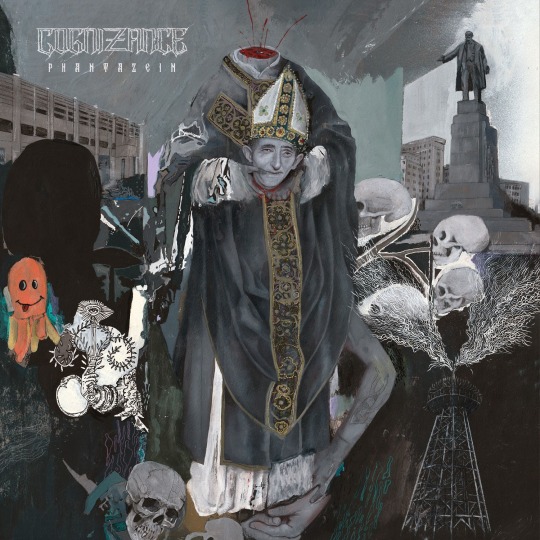#phantazein
Text
youtube
cognizance-a brain dead memoir
#cognizance#technical death metal#tech-death#death metal;#heavy metal;;#metal#phantazein#2024 album#Youtube
1 note
·
View note
Text
Review: Cognizance – Phantazein (Willowtip)
My review of Cognizance – Phantazein (Willowtip), written for Heavy Music HQ:

Originating in Leeds, UK, Cognizance are adept at crafting a sublime technical death metal album. Three years after the release of Upheaval, they celebrate their return with their third album Phantazin, another prominent effort which brings a special sonic exhibition to the fore once again.
Phantazein is striking, catchy and groovy technical death metal, whose progressive strains also stand out. While it becomes atmospheric in many moments, it institutionalizes its musical horizon in the soundscape of modern death metal in the strongest form. From David Diepold’s drumming to Alex Baillie and Apostolis Karydis’ riff exchanges, Chris Binns pounding bass tunes, and Henry Pryce’s performance, which is like a beast behind the microphone, all keep Phantazein at the same peak quality of the last two albums. The songwriting and performances are impressive and the production pushes the album to the point it needs to keep the listener excited until the end. Phantazein is a special work for the band’s new audience and a respectable work for Cognizance fans.
Rating: 4/5
0 notes
Video
youtube
Cognizance "Phantazein" (Full Album Stream)
0 notes
Text
phenomenology (n.) Look up phenomenology at Dictionary.com
1797, from German Phänomenologie, used as the title of the fourth part of the "Neues Organon" of German physicist Johann Heinrich Lambert (1728-1777), coined from Greek phainomenon (see phenomenon) + -logia (see -logy). Psychological sense, especially in Gestalt theory, is from 1930. Related: Phenomenological.
phenomenon (n.) Look up phenomenon at Dictionary.com
1570s, "fact, occurrence," from Late Latin phænomenon, from Greek phainomenon "that which appears or is seen," noun use of neuter present participle of phainesthai "to appear," passive of phainein (see phantasm). Meaning "extraordinary occurrence" first recorded 1771. Plural is phenomena.
-----------
phantasm (n.) Look up phantasm at Dictionary.com
early 13c., fantesme, from Old French fantosme "a dream, illusion, fantasy; apparition, ghost, phantom" (12c.), and directly from Latin phantasma "an apparition, specter," from Greek phantasma "image, phantom, apparition; mere image, unreality," from phantazein "to make visible, display," from stem of phainein "to bring to light, make appear; come to light, be seen, appear; explain, expound, inform against; appear to be so," from PIE root *bha- (1) "to shine" (source also of Sanskrit bhati "shines, glitters," Old Irish ban "white, light, ray of light"). Spelling conformed to Latin from 16c. (see ph). A spelling variant of phantom, "differentiated, but so that the differences are elusive" [Fowler].
phantom (n.) Look up phantom at Dictionary.com
c. 1300, fantum "illusion, unreality," from Old French fantosme (12c.), from Vulgar Latin *fantauma, from Latin phantasma "an apparition" (see phantasm). The ph- was restored in English late 16c. (see ph). Meaning "specter, spirit, ghost" is attested from late 14c.; that of "something having the form, but not the substance, of a real thing" is from 1707. As an adjective from early 15c.
0 notes